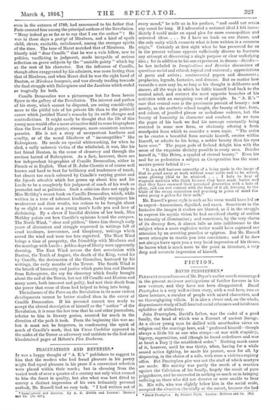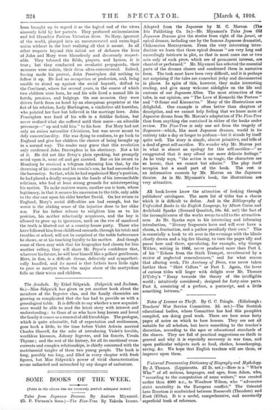FICTION.
DAVID PENSTEPHEN.*
PLEASANT remembrances of Mr. Pryce's earlier novels encouraged in the present reviewer anticipations of further favours in his new venture, and they have not been disappointed. David Penstephen is a very well-written story, with a real hero, two or three heroines, a number of people with mixed characters, and no thoroughgoing villain. It is also a clever and, on the whole, dispassionate study of half-hearted social reformers and intolerant upholders of orthodoxy.
John Penstephen, David's father, was the cadet of a good family, tho head of which was a Baronet of ancient lineage. As a clever young man he dallied with unorthodox views on religion and the marriage laws, and " professed himself—though always a little bit as one who stoops—at war with stupidity, bigotry, superstition, and (though he loved orderliness and was at heart a Tory !) the established order." Nothing much came of it, however, until he was thirty, when, having for a while ceased active fighting, he made his protest, once for all, by dispensing, in the choice of a wife, with even a visit to a registry office. But Ponstephen pare was not the stuff of which martyrs are made. His mutiny was partly the result of a reaction against the Calvinism of his family, largely the result of pure priggishness, and he succeeded in nothing so much as in bringing suffering on those who did not deserve or were unable to bear it. His wife, who was slightly below him in the social scale, accepted the situation cheerfully at the outset, because she had • David Penstephea. By Ricbard Puce. London: Methuen and Co. Raj
been brought up to regard it as the logical end of tho views sincerely held by her parents. They professed antinomianism and led blameless Puritan Victorian lives. So Mary, ignorant of tho world, plunged into an unconsecrated and extra-legal union without in the least realizing all that it meant. In all other respects beyond this initial act of defiance the lives of John and Mary were blamelessly and decorously respect- able. They tabooed the Bible, prayers, and hymns, it is true ; but they conducted no secularist propaganda, their manners were sedate, their dress ultra-conventional. Indeed, having made his protest, John Penstephen did nothing to follow it up. He had no occupation or profession, and, being unable to stand up against the social boycott, drifted to the Continent, where for several years, in the course of which two children were born, he and his wife lived a nomad life in hotels, pensions, and lodgings. On one occasion they were driven forth from an hotel by an obsequious proprietor at the fiat of his relation, Lady Harbington, a vindictive old harridan, who painted her face but believed in the marriage laws. John Penstephen was fond of his wife in a fishlike fashion, but never realized what she suffered until their nurse—an adorable personage—" up and told him " to his face. For Mary had not only an anima naturaliler Christiana, but was never meant to defy conventionality. She was dying to conform, to go back to England and give her children the chance of being brought up in a normal way. The reader may guess that this revelation only confirmed John Penstephen in his obstinacy. Not a bit of it. He did not like Betsy's plain speaking, but promptly acted upon it, went off and got married. But on his return to Homburg he received a telegram informing him that, by the drowning of his cousin and his cousin's son, he had succeeded to the baronetcy. So that, while he had regularized Mary's position, he had placed a deadly weapon in the hands of his irreconcilable relations, who had at least strong grounds for misinterpreting his motive. To make matters worse, another son is born, whose legitimacy, in that it secures his succession to the title, only adds to the slur cast upon his older brother David. On her return to England, Mary's social difficulties aro bad enough, but far worse is the abiding sense of the injustice done to her elder son. For his father refuses to enlighten him as to his position, his mother reluctantly acquiesces, and the boy is allowed to grow up in ignorance, until on the eve of manhood the truth is blurted out at a country-house party. Those who have followed him from childhood onwards, through his trials and troubles at school, will not be surprised at the noble forbearance he shows, or at his touching loyalty to his mother. And though some of them may wish that his biographer had chosen for him another calling, they will share Mr. Pryee's confidence that, whatever his future, he will bear himself like a gallant gentleman. Hero, in fine, is a difficult theme, delicately and sympatheti- cally handled, and its moral is that fathers have little right to pose as martyrs when the major share of the martyrdom falls on their wives and children.



































 Previous page
Previous page